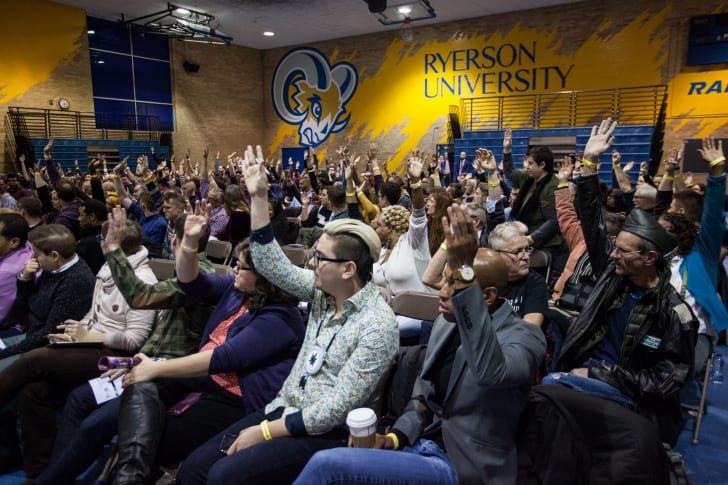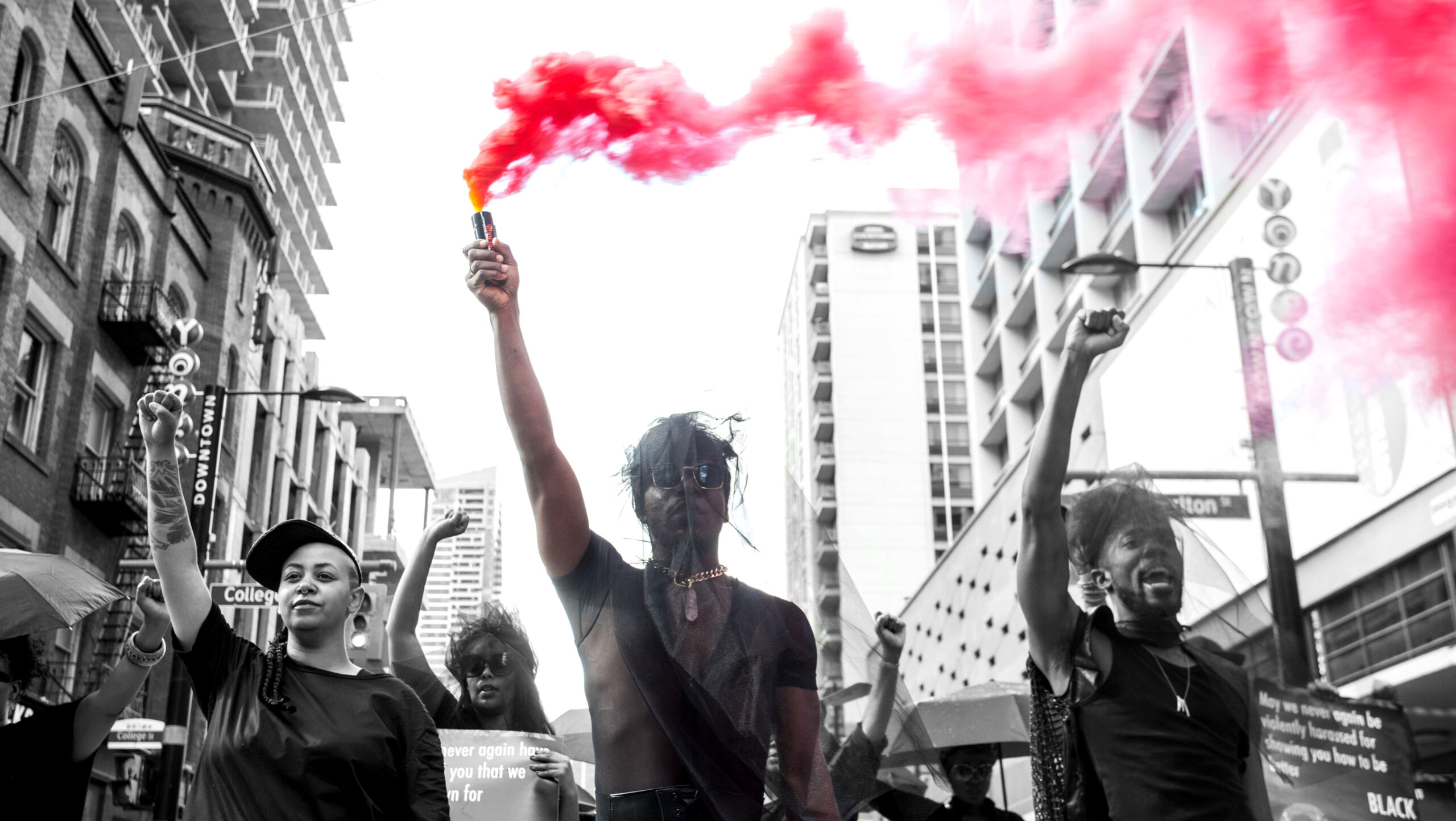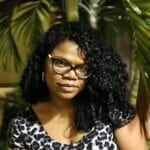In 2016, Black Lives Matter Toronto (BLMTO) protested against Pride Toronto’s history of anti-Blackness with a sit-in during the parade, where they called for a more inclusive festival. One of the demands brought forth by BLMTO was a ban on uniformed officers, as well as Toronto Police Service (TPS) floats and cruisers, from participating in the event. The demand was meant to address the history of negative police interactions with Black and queer communities. Pride members eventually voted in favour of keeping uniformed officers out of the parade, which divided the community and launched months of criticisms, apologies and attempts by city councillors to defund the parade.
Uniformed police haven’t marched in the city’s Pride parades since then, and won’t be present this year, either.
In October 2018, Pride announced that, after a two-year ban, police were welcome to apply to march in the 2019 parade. Following intense criticism over Pride’s lack of transparency, the issue was put to a vote in January and members, once again decided to keep uniformed police out of the parade.
After BLMTO’s sit-in, police involvement in Pride celebrations became a contentious issue in other Canadian cities, including Halifax, Winnipeg, Calgary, Edmonton and Vancouver. In the last two years, police mishandling of missing persons cases within the LGBTQ2 community, especially in Toronto, has provoked further debate over whether uniformed officers should be allowed to march in Pride parades.
Here’s a timeline of key events in the lead-up to, and aftermath of, Pride Toronto’s decision to exclude uniformed police from its parade.
March to May 2016: Tensions flare between Toronto police and activists, including BLMTO, who camp outside police headquarters for weeks demanding police accountability over shootings like that of Andrew Loku, a Black man who lived with mental illness, who was killed by police in July 2015. TPS Chief Mark Saunders tells CBC’s Metro Morning that he didn’t visit the protest camp because he didn’t think BLMTO’s demands were reasonable.

People sit in front of the Toronto Police Service headquarters on March 21, 2016 to protest the Special Investigations Unit clearing a Toronto police officer of wrongdoing in the shooting death of 45-year-old Andrew Loku. Credit: The Canadian Press/Cole Burston
July 3, 2016: BLMTO, the honoured group at Pride, holds a half-hour protest that becomes one of the biggest news stories in the country. The group gives Pride Toronto a list of nine demands, which include increased representation of Black, Indigenous, non-white LGBTQ2 and other vulnerable communities at the festival, and calls for a ban of uniformed police, their floats and cruisers from participating in the parade. During the protest, Pride Toronto agrees to all of their demands.

Black Lives Matter Toronto stage a sit-in at Pride Toronto on July 3, 2016. Credit: Nick Lachance/Xtra
In a 2018 Xtra interview with TPS’s LGBT liaison officer, Danielle Bottineau, she recalls the reaction from some police officers to BLMTO leading the parade. “ I had several phone calls from colleagues saying they need to get them out of the parade,” she says. When the sit-in took place, officers again got in touch with her, insisting that “we need to go drag them out of there.”
July 4, 2016: Pride backtracks on the demands they agreed upon. “My priority yesterday was to make the parade move,” Mathieu Chantelois, the executive director of Pride Toronto tells CP24. “Frankly, Black Lives Matter is not going to tell us that there are no more floats in the parade.” Pride Toronto releases a statement on its Facebook page saying it never agreed to BLMTO’s demand to exclude police from the march, but that it will hold two town hall meetings, the first in August, to gather feedback.
Aug 10, 2016: Chantelois resigns from his post as executive director following intense scrutiny over how he handled BLMTO’s protest, as well as “serious allegations” made against him by staff.
Aug 30, 2016: During a tense first town hall meeting, community members grill Pride Toronto board members on the organization’s mishandling of BLMTO’s demand to exclude uniform police from the parade, as well as the festival’s lack of inclusivity of deaf people, seniors, youth, sex workers, homeless people, Latinx people and people with disabilities. “Some people feel afraid of having the police in the parade and some people feel afraid not having the police in the parade,” lawyer Maurice Tomlinson tells the board of directors. “Those are two truths which we have to accept.”
Sept 20, 2016: In a lengthy statement posted to their website, Pride Toronto’s board apologizes for a litany of wrongs, including a history of anti-Black racism, the handling of the BLMTO protest at Pride 2016, instances of racism experienced by community members both before, and as a result of, the protest and for any unfair attacks directed at law enforcement.
The organization says it is committed to following through on all of the demands made by BLMTO and will hold a public town hall this winter to demonstrate the progress it has made. However, it says the decision to include or exclude police will fall to a dispute resolution process.
Nov 11, 2016: News breaks that TPS has charged 75 men and two women in a six week-long operation aimed at cracking down on cruising in Etobicoke’s Marie Curtis Park. The operation, known as Project Marie, involved undercover officers from 22 Division who went to the park either looking for people engaged in sexual activity, or arresting and charging individuals who allegedly solicited the officers for sex. Protesters and community members hold numerous events, like Queers Crash the Beat, condemning the sting. Just five months ago, Toronto police apologized for the 1981 bathhouse raids.

Community members talked to police at Marie Curtis Park on Nov 19, 2016, just over a week after police announced charges in Project Marie. Credit: Nick Lachance/Xtra
Jan 17, 2017: At Pride Toronto’s annual general meeting, members vote overwhelmingly in favour of keeping uniformed police out of this year’s and future parades. Members ask Pride Toronto to officially endorse all of BLMTO’s demands, but the meeting’s chair initially says that, in order to discuss them, they needed to have been added to the agenda 60 days prior to the meeting. Several community members say they didn’t receive the notice. After a heated debate, BLMTO’s demands were added to the agenda and community members voted to approve all of them.

Pride members vote during the Jan 17, 2017 AGM. Credit: Nick Lachance/Xtra
Feb 16, 2017: Pride Toronto names Olivia Nuamah as its new executive director following a six-month vacancy in the position.
March 28, 2017: John Campbell, a councillor from the suburban ward of Etobicoke Centre, drafts a motion to cut off the $260,000 grant that the City of Toronto gives to Pride each year because of its decision to ban uniformed police, floats and cruisers from the parade. Several other councillors say they will support the motion.
May 8, 2017: Pride Toronto easily clears the first hurdle in order to keep its city funding. Toronto city council’s economic development committee voted unanimously to continue providing Pride Toronto with a quarter-million dollar annual grant.
June 25, 2017: BLMTO makes a surprise return to Pride after declining to sign up in advance.

Black Lives Matter Toronto at Toronto Pride on June 25, 2017. Credit: Nick Lachance/Xtra
July to Nov 2017: After two men go missing — Selim Esen in April and Andrew Kinsman following Pride celebrations in June, police launch Project Prism to investigate. Months of community consultations coincide with mounting concerns that a serial killer is on the loose in the Village. TPS continue to deny these claims. Police are also criticized by the LGBTQ2 community over their handling of the deaths of Tess Richey, a 22-year-old woman murdered in the Village, and Alloura Wells, a trans woman found dead near the Rosedale ravine.

A poster of Alloura Wells hangs in Barbara Hall Park during the Vigil, Accountability and Justice for Trans People rally in Toronto on Nov 19, 2017. Credit: Andrej Ivanov/Xtra
Jan 18, 2018: Toronto police charge 66-year-old landscaper Bruce McArthur in the deaths of Selim Esen and Andrew Kinsman. Over several months, McArthur is charged with eight counts of first-degree murder in the deaths of Selim Esen, Andrew Kinsman, Majeed Kayhan, Dean Lisowick, Soroush Mahmudi, Skandaraj Navaratnam, Abdulbasir Faizi and Kirushna Kanagaratnam. TPS is heavily criticized for not listening to the concerns of LGBTQ2 communities who repeatedly told them that a serial killer was on the loose.
Feb 27, 2018: Police Chief Mark Saunders blames civilians for failing to help the investigation.

Toronto police Chief Mark Saunders sits at a police board meeting at police headquarters on March 22, 2018. Credit: Nick Lachance/Xtra
April 2, 2018: In a joint statement made with five other LGBTQ2 organizations, Pride Toronto asks Toronto police to withdraw its application to march in the 2018 parade, citing recent mishandling of missing persons cases as creating further strain between police and LGBTQ2 communities.
“This has severely shaken our community’s already often tenuous trust in the city’s law enforcement,” the statement reads. “We feel more vulnerable than ever.” In a statement the next day, Saunders says he hopes the move will be a step forward in addressing the concerns of LGBTQ2 communities.
Oct 16, 2018: Pride Toronto lifts a two-year ban on TPS, saying they would be allowed to submit an application to march in the 2019 parade if they meet Pride Toronto’s entrance policy. Pride’s executive director Olivia Nuamah says she supports lifting the ban, in part because of the financial strain the decision causes the organization.
Dec 10, 2018: The Ontario Human Rights Commission (OHRC) releases “A Collective Impact,” an interim report on its inquiry into racial profiling and racial discrimination of Black people by TPS. The findings reveal that Black people are 20 times more likely to be shot by police than white people, even in instances where the latter were armed and more confrontational with police. Discussions over the OHRC’s findings confirming what people already knew about police brutality, the uncertain future of Pride Toronto and whether it’s time for alternative, downsized Prides continue.
Jan 22, 2019: After years of the issue dividing the city, Pride Toronto members vote 163 to 161 against including uniformed officers in the annual event. Member and activist Gary Kinsman tells City News (Pride banned media during this AGM) that the vote was meant to be binding for two years. However, he says the board clarified that the decision would stand until Pride Toronto members choose to vote on the issue again. Nuamah defends her role as executive director and refuses to step down following intense scrutiny of how she’s run the organization.
June 3, 2019: Ontario Premier Doug Ford says he won’t march in Toronto’s Pride parade this month because uniformed police are still banned. His late brother, Rob, never attended Pride as city mayor (instead opting for the cottage). Ford has never attended Pride either, not even during his four years as a city councillor. In 2014, he said that he wouldn’t go because he didn’t want to see “buck naked men running down the street.”
June 15, 2019: Ford marches alongside police in York Region Pride, though organizers say they weren’t aware of his plans.


 Why you can trust Xtra
Why you can trust Xtra


